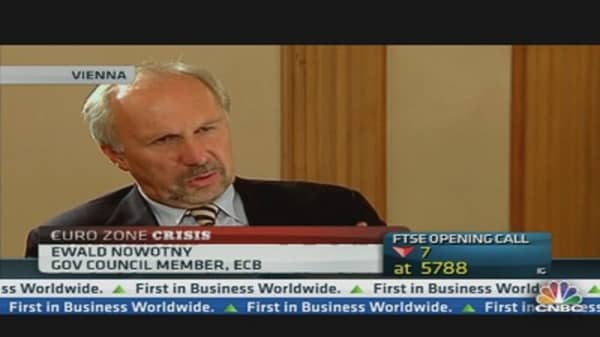Spain might have the luxury of time to delay a request for bailout funds but the timetable for Greece is more urgent, according to European Central Bank (ECB) policy maker Ewald Nowotny.
Reiterating his view that Spain does not need to request immediate aid, Nowotny told CNBC that it was no surprise that Spain was delaying any credit request.
"[A Spanish bailout] is a decision that has to be taken by the Spanish government. As far as I can see… there is no need [for a bailout] as the government is fully financed until the end of this year."
Spanish Prime Minister Mariano Rajoy continues to deny that his country will sign up to the ECB's proposed sovereign bond-buying program — called Outright Monetary Transactions (OMT) — as it would mean that Spain would have to agree to strict conditions.
"If you go for OMT, this is a program with very strict conditions, but as long as you are not in this program you are not under these conditions. I could imagine that this is one of the aspects that is on the minds of the Spanish government," Nowotny said.
One in four Spaniards is unemployed and figures released on Monday showed that retail sales have dramatically fallen from a year ago as a recent hike in value-added tax (VAT) deters shoppers. More bad news was released on Tuesday morning as data revealed that gross domestic product (GDP) fell for a fifth consecutive quarter.
Nowotny, however, remained optimistic about Spain's economy. He said it was hard to determine when and if Spain would apply to the ECB's bond buying scheme to help lower its debts.
(Read More: Spain, Italy Reject Bailout Calls as Political Risks Rise)
"It is very difficult to say… the economic perspective is improving, the finance perspective is improving. Nobody can make serious forecast for 2013. At least from my point of view, I understand the government wants to keep a certain flexibility."
Greece Doesn't Have Much Time
Nowotny was less sanguine about Greece's near-term prospects, however, arguing that there was a greater sense of urgency to find funds for Greece by mid-November.
The heads of the International Monetary Fund, World Bank, OECD and International Labor Organization are expected to try to convince German Chancellor Angela Merkel at a meeting on Tuesday that Greece needs debt relief to avoid intensifying the country's crisis.
A German government spokesman said on Monday that a write-down of Greek debt was "out of the question." The ECB has also said it is not prepared to take losses on its holdings of Greek debt.
Nowotny said that the decision over any ECB losses was "political."
"The ECB has rules and it has to follow these rules…This is a political decision that has to be taken and I have to add it has to be taken rather soon. Greece will need new financing by mid-November… we do not have much time to discuss this."
EU Budget 'Commissioner' Could Work
As EU leaders prepare to meet in November to discuss the long-term EU budget, the German proposal of a European commissioner with the power to veto EU member state budgets resurfaced.
(Read More: Merkel, Hollande Clash on EU Budget Tsar Before Summit)
The proposal for far-reaching reform and greater European integration by German finance minister Wolfgang Schaeuble has met with approval from ECB chief Mario Draghi but is vehemently opposed by Britain which does not want to give up more sovereignty to Brussels.
Nowotny agreed in principle with the proposal of transferring sovereignty in fiscal policy affairs to a central commissioner but told CNBC that such a policy would need public backing, via referendums, and a lot of political preparation.
"I think it makes a lot of sense," Nowotny said, though he added it would be hard to implement such a proposal for all 27 members.
"But looking at the practical side of it one has to be aware that most probably most of these proposals will involve treaty changes and treaty change is not a very easy thing nowadays in the EU."
"We know there are very different opinions among [the 27 EU members] and especially if I think of our friends in the U.K.," he added, noting that such a commissioner could oversee the euro zone rather than the entire EU.
"If I speak of the eurogroup I would see a real perspective to have such an arrangement. If I think about the Europe 27, EU 27 there I think things look a bit more difficult."
"I would realistically not dare to give a time frame," Nowotny said.




